人教版高二英语必修五unit1 Warming up
人教高中英语必修5Unit1Warming up (共16张PPT)
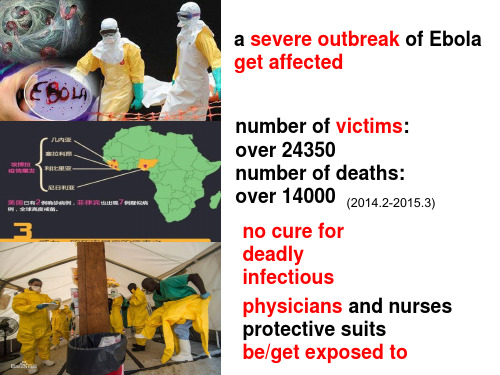
John Snow was a famous, expert doctor in London, who attended Queen Victoria as her personal physician.
King Cholera was a deadly and infectious disease at that time, whose cause and cure were not understood.
• To prevent cholera from spreading again, what did John Snow do?
① Suggested that the source of all water supplies be examined. ② Instructed the water companies not to expose people to the polluted water any more.
__________________________ __________________________ __________________________
The passage is written as ___C______.
A. a news re. a scientific report D. a book review
➢It is written according to the stages in scientific research.
Make a question Think of a method Collect results Analyse results Find supporting evidence Draw a conclusion
高中英语(人教版必修5)教师用书:Unit 5 Section_Ⅰ Warming Up - Reading — Pre-reading (含答案)
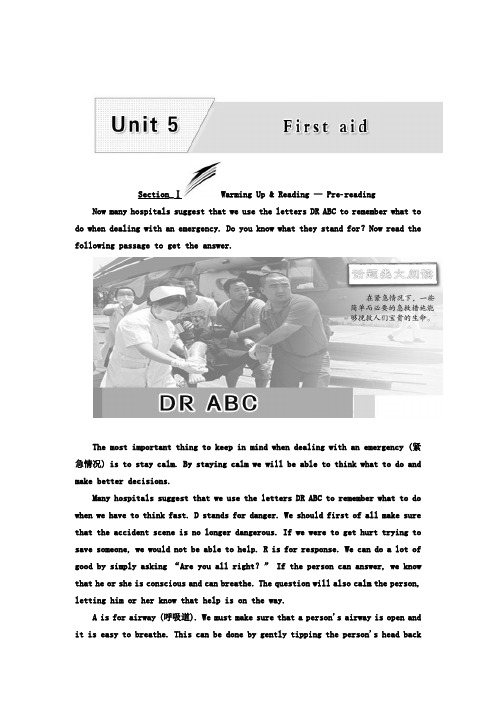
Section_ⅠWarming Up & Reading —Prereading Now many hospitals suggest that we use the letters DR ABC to remember what to do when dealing with an emergency. Do you know what they stand for?Now read the following passage to get the answer.The most important thing to keep in mind when dealing with an emergency (紧急情况) is to stay calm. By staying calm we will be able to think what to do and make better decisions.Many hospitals suggest that we use the letters DR ABC to remember what to do when we have to think fast. D stands for danger. We should first of all make sure that the accident scene is no longer dangerous. If we were to get hurt trying to save someone, we would not be able to help. R is for response. We can do a lot of good by simply asking “A re you all right?” If the person can answer, we know that he or she is conscious and can breathe. The question will also calm the person, letting him or her know that help is on the way.A is for airway (呼吸道). We must make sure that a person's airway is open and it is easy to breathe. This can be done by gently tipping the person's head backslightly. B is for breathing. We should check that the person can breathe. Is his or her chest moving?If the person is not breathing, we must try to start his or her br eathing at once, using the mouthtomouth method. If this is not done within five minutes, the person will die. If a person is breathing but not conscious, it is usually best for him or her not to be moved. C is for circulation (循环;环流).Is the person's blood circulating?We can look for colour, coughing, and eye movement. We can also check a person's pulse (脉搏) by putting a finger on the person's neck or wrist.This is what we call DR ABC, which can remind us of what to focus on when there is an emergency.Warming Up1.Look at the pictures and tell what happened.(1)The girl in Picture A cut_her_finger.(2)The girl in Picture B burnt_her_hand.(3)The man in Picture C got_an__electric_shock.(4)The woman in Picture D was_drowning.2.Nowadays there are a lot of unexpected accidents.What would you do in such situations?(1)What kind of first aid should you give to a snake bite?①The_person_bitten_must_get_a_doctor_or_go_to_hospital_at_once.②Speed_is_very_important.③It_will_help_the_doctor_greatly_if_you_can_tell_him_what_kind_of_snake_it_was,_or_describe_the_situation.(2)What kind of first aid should you give to bleeding?①Try_to_stop_the_bleeding.②Press_a_handkerchief_onto_the_bleeding_point_and_hold_it_there.③Hold_up_the_part_of_body_which_is_bleeding_if_possible.(3)What kind of first aid should you give to a sprainedankle?①Tied_with_medical_bandage.②It_is_better_to_avoid_walking_with_the_injured_ankle.③It_is_correct_to_use_ice_bag_for_removing_pain_and_bleeding,_and_also_not_influence_our_own_body_healing.(4)What kind of first aid should you give to a choke?To_treat_a_choke,_you_should_make_him/her_spit_by_patting_him/her_on_the_back.(5)What kind of first aid should you giveto a broken arm?①Do_not_move_the_patient.②Support_the_broken_arm_in_the_most_comfortable_position.③Get_medical_help_immediately.Fast Reading1.Read the text quickly and complete the main idea of it.The text mainly introduces (1)three types of burns and their characteristics as well as how to give (2)first_aid_treatment when burns happen.2.Scan the text and then choose the best answer according to the text.(1)In the text, burns are sorted according to the ________ of the skin burned.A.layer B.functionC.type D.area(2)Which of the following is NOT the function of the skin according to the text?A.It protects you against disease, poisons and the sun's harmful rays.B.It helps the heart beat.C.It can keep you warm or cool.D.It prevents your body from losing water and gives the sense of touch.(3)When cooling burns, cool water is used to do the following EXCEPT ________.A.stop the burning processB.prevent the pain becoming unbearableC.reduce swellingD.prevent any blisters being broken(4)Which of the following first aid treatment is RIGHT according to the text?A.Take clothing off the burned area even though it is stuck to the burn.B.Do not put cold water on second degree burns.C.If burns are on the face, the victim should sit up.D.If the injuries are second degree burns, it is unnecessary to get the victim to the doctor or hospital at once.(5)If someone gets burned and his hands get black and white and charred, it belongs to________.A.the first degree B.the second degreeC.the third degree D.none of the above答案:(1)~(5) ABDCCCareful Reading1.Read the text carefully and then fill in the blanks.BurnsCauses hot liquids, steam, fire, radiation, the sun, electricity orchemicals(1)Types First degree burns Second degree burns Third degree burnsCharacteristics◆dry, red andmildly(2)swollen◆mildly painful◆turn (3)whitewhen pressed◆rough, red andswollen◆blisters◆(4)watery surface◆extremely painful◆black and whiteand charred◆swollen; often(5)tissue underthem can be seen◆little or nopain if (6)nervesare damaged; maybe pain aroundedge of injuredareaFirst aid treatment◆Take off clothing and (7)jewellery near the burn.◆Place(8)cool,_clean, wetcloths on them untilthe pain decreases.◆Place cool clothson the burned arearepeatedly for(9)an_hour or so.◆Send the victim to the doctor orhospital at once.◆(10)Dry the burned area gently.◆Cover the burned area with a dry, clean (11)bandage.◆Keep burned arms or legs (12)higher than the heart.2.The text can be divided into five parts.Then find out the main idea of each part.Part 1:The_importance_of_skinPart 2:Causes_of_burnsPart 3:Types_of_burnsPart 4:Characteristics_of_burnsPart 5:First_aid_treatmentSummaryFill in the blanks according to the text.The skin, which acts as a barrier 1.against disease, poisons and the sun's harmful rays, is an essential part of your body. So if your skin gets burned it can be very serious.Depending on 2.which_ layers of the skin are burned, they are called first, second, third degree burns.First degree burns make an effect 3.on only the top layer of the skin and it turns white when 4.pressed (press).Second degree burns include severe sunburn and burns 5.caused (cause) by hot liquids.Third degree burns cause little or no pain if nerves are damaged; may be pain around edge of injured area.If possible, we should do some first aid.First, remove clothing using scissors if necessary 6.unless it is stuck to the burn.Take off other clothing near the burn.Cool burns immediately with cool 7.but not icy water which prevents the pain becoming 8.unbearable (bear) and reduces swelling.It is helpful to squeeze cool cloths 9.out_from a basin and place them on the burned area over and over again.Holdthe bandage 10.in place with tape if stly, it is vital that we should get the victim to the doctor or hospital at once if the situation becomes worse and worse.DiscussionDiscuss in groups of four to see whether the following is right or wrong.If it's wrong, explain why and give the correct statement.Sam knocked over a kettle full of boiling wateronto his legs.His legs became red, swollen and covered with blisters.Sam broke the blisters and poured icy water from the fridge onto the skin.Wrong.Sam_should_not_have_broken_the_blisters_because_the_burns_could_beco me_infected.He_should_have_poured_cool_water,_not_icy_water_on_the_burn.。
新人教版高中英语必修5 Unit1_Great_Scientists (1)

3. Why is there no death at No. 20 and 21 Broad Street as well as at No. 8 and 9 Cambridge Street? These families had not drunk the water from the Broad Street pump.
Nobody knew the cause of the serious disease of cholera
Unit 1 Great Scientists
Period 1 Warming up & Pre-reading Period 2 Reading Comprehension Period 3 Reading & Listening Period 4 Learning about Language Period 5 Grammar Past Participle Period 6 Listening Period 7 Reading and Writing
It begins in the stomach and a severe case can lead to death without immediate treatment.
And the victims died very quickly from a loss of liquid after severe vomiting(呕吐) and diarrhea(腹泻).
Come on!
Skimming Who was the great scientist in the passage and what was the deadly disease of its day?
高中英语《必修五第一单元单元词汇课》优质课教案、教学设计

教案设计(Learning about Language)部分由“词汇学习”和“语法学习”两项内容组成。
“词汇学习” 部分练习1 通过词的后缀训练名词与形容词之间的相互转换提倡学生使用词典。
练习2 选词填空练习,利用语篇集中训练本单元的一些重点词汇的用法。
练习3 是单句填空,而且所选的十个句子或是引文或是谚语。
“语法学习”部分主要是帮助学生了解、熟悉并掌握情态动词的用法,共有三项练习。
“语言运用”(Using Language)部分主要是让学生运用本单元所学的语言知识与课文内容进行听、说、读、写等的综合训练。
“听与说” (Listening and speaking); 是听前准备活动。
“读与写”(Reading and writing)主要设计是:阅读内容主要讲述一位来自高中的学生对全球变暖十分关注并向地球保护协会写了一封信询问措施。
协会给出了相当令人满意的回信。
短文后的三个问题帮助学生理解文章的内容。
写信的部分主要是要求学生根据上面阅读文章的内容通过思考写出自己的思想、自己的做法,尝试解决问题的不同途径。
教材提供给学生一些写作时要思考的问题,帮助学生完成写作构思。
“小结”(S ummin g U p)部分让学生根据所给出的提示对所学各项内容进行总结。
“学习建议”(L e a r nin g T ip)部分主要建议学生看阅读报纸,多读书多总结,以培养学生运用语言资源的能力。
五、教学重点Teaching important pointsa.The usage of language points of this unit.b.To learn to use these words.教学难点Teaching difficult pointsa.Enable students to get the hang of the language points completely.b.Get students to discuss warmly and express their own and excellent idea.教学方法Teaching methodsa.Brainstormingb.Task based language teaching.c.Individual, pair or group work to finish each task.d.Discussion.教学过程:1.concludevi.推断出vt.结束①conclude 推断出;断定conclude...with... 以...结束conclusion n .结论;结束arrive at/come to/reach/draw a conclusion 得出结论in conclusion 总而言之学生去说;学生能做的教师就不要代替学生去做;学生回答问题无论对还是错,教师不要急于评判,让学生自已去评判与总结;对发言积极的学生要及时鼓励,决不能因为他们的答案与教师的标准答案不一样就否定并伤害学生的自尊心。
高中英语Unit5Musicpart1WarmingUp检测含解析新人教版必修

Part 1 Warming Up, Pre-reading, Reading & Comprehending基础过关练Ⅰ.单词拼写1.He (假装) to be taking the online course when his mother came in.2.Many researchers believe that heavy television-watching affects students' school (表现).3.When the music started, tears (滚落) down his cheeks.4.She e a living as a part-time secretary two years ago.5.I was so f with him that I recognized his voice the moment I picked up the phone.6.All payments can be made through the smart phone, so no c is needed. Ⅱ.选词填空1.I, who have been in this school for five years, quite the campus.2.Great importance should the prevention and control of COVID-19.3.Mack Dagger is a millionaire, who, since he was a little boy, flying to space.4. , I just don't want to go.5.The farmers will be paid for their grain , instead of by cheque.6.When Amy her dad, he got mad.7.The meeting didn't until noon.8.You can me to keep your secret.Ⅲ.单句语法填空1.Her (humor) story made me burst into laughter.2.A career in law is becoming increasingly (attract) to young people.3.Medical workers in the hospital (attach) to the medical college nearby are vaccinating (给……接种疫苗) people in this community against COVID-19 this week.4.He didn't want to go to school, so he pretended (be) ill.5.His voice on the phone was familiar me.6.You may rely on that the work will be finished ahead of time.Ⅳ.完成句子1.把它拿近点,以便我能看得清楚些。
人教高中英语必修5Unit1Warming Up (共18张PPT)
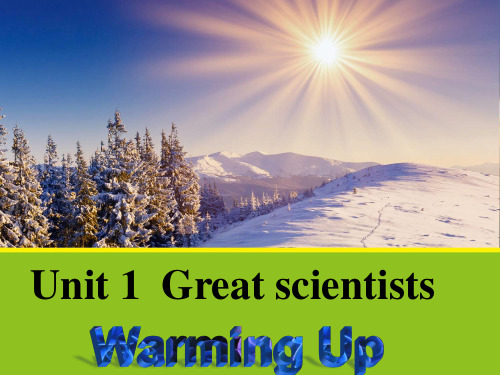
infectious adj. 传染的 cholera n. 霍乱
What is a scientist?
AAlsl csiceinentitsitstiss ahapveerson who explores asonmd eextaympeinoefs aspects of the physical wspoercldiatloizbateitotner(专un门derstand how they f化un),cstiuocnh. as the human body or the oceans, which provides them with a more formal and specific title.
A. Charles Darwin B. Archimedes
C. Thomas Edison
“Give me a place to stand on, and I can move the earth.”
Archimedes
“给我一个支点,我就可以翘起整个地球.”
2.Who was the painter that studied dead bodies to improve his painting of people?
Imagination is more important than knowledge
imaginative
Who invented the light-bulb and give electricity to everybody in large cities?
Thomas Alva Edison
How science changes our life?
高中英语Unit 1 Great scientists 人教版必修五
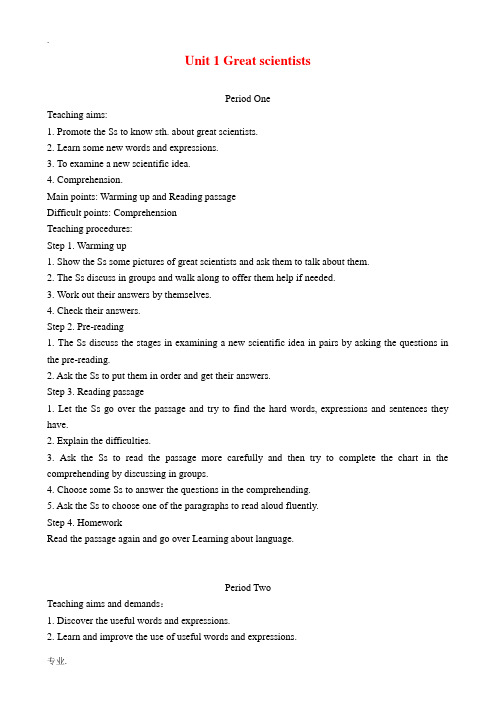
Unit 1 Great scientistsPeriod OneTeaching aims:1. Promote the Ss to know sth. about great scientists.2. Learn some new words and expressions.3. To examine a new scientific idea.4. Comprehension.Main points: Warming up and Reading passageDifficult points: ComprehensionTeaching procedures:Step 1. Warming up1. Show the Ss some pictures of great scientists and ask them to talk about them.2. The Ss discuss in groups and walk along to offer them help if needed.3. Work out their answers by themselves.4. Check their answers.Step 2. Pre-reading1. The Ss discuss the stages in examining a new scientific idea in pairs by asking the questions in the pre-reading.2. Ask the Ss to put them in order and get their answers.Step 3. Reading passage1. Let the Ss go over the passage and try to find the hard words, expressions and sentences they have.2. Explain the difficulties.3. Ask the Ss to read the passage more carefully and then try to complete the chart in the comprehending by discussing in groups.4. Choose some Ss to answer the questions in the comprehending.5. Ask the Ss to choose one of the paragraphs to read aloud fluently.Step 4. HomeworkRead the passage again and go over Learning about language.Period TwoTeaching aims and demands:1. Discover the useful words and expressions.2. Learn and improve the use of useful words and expressions.Main points: Learn to use the words and expressions that the Ss discover.Difficult points: Improve the use of the words and expressions.Teaching procedures:Step 1. Learning about language1. Discover the useful words and expressions in this unit in groups of four.2. Ask the Ss to show their results to the class.3. Ask them to study the words and expressions in Ex.1.4. Ss have a discussion and do the exercises.5. Check their answers.6. Change the verbs into nouns and make sentences by using “make a …〞Step 2. Using words and expressions1. Make sure the Ss know the words and expressions.2. Let the Ss work in groups to complete the blank in Ex.1.3. Check their answers.4. Do the translations. Ss discuss the sentences and the translate them into English, using the words and phrases in brackets.Step 3. Words learning1. Show the Ss a list of prefixes to talk about them.2. Ask them to work in groups to find some words with the prefixes and study their meanings.3. Let them show their results to the class.4. Walk around the class to give them help if needed.Step 4. Study the use and meanings of suggest1. Study the meaning of suggest by looking the dictionary entry.2. Match the meanings with the sentences on the right in Ex.4.3. Check their answers.Step 5. HomeworkTeaching aims and demands:1. Discover the useful structure.2. Learn to use the grammar of past participle.3. Enable the Ss understand the past participle using as attribute and predicative.Main points: Learn the usage of the past participle using as attribute and predicative.Difficult points: Use the useful structure.Teaching procedures:Step 1. RevisionReview the past participle of some verbs.Step 2.1. Look at the chart and study the phrases.Past participle as the attribute and the predicative(1) terrified people(2) reserved seats(3) polluted water(4) a crowded room(5) a pleased winner(6) children who look astonished(7) a vase that is broken(8) a door that is closed(9) the audience who feel tired(10) an animal that is trapped3. Ask the Ss the following questions:(1) What kind of words before the past participles?(2) What kind of words after the past participles?4. Ask the Ss find the sentences using the past participle in the reading passage.5. Ss have a discussion and complete the chart with the same meaning of the phrases above.6. Ss show their results to the class.7. Complete the sentences in Ex.3.Step 3. Using structure1. Make sure the Ss know the words and the discuss in groups to finish the sentences using past participle.(Ex.1)2. Rewrite the sentences into one sentence using the past participle as the attribute or predicative.3. Check their answers.Step 4. HomeworkWrite down 1, 3, 5, 7 of Ex.2 in the exercise book.Period FourTeaching aims and demands:1. Improve the Ss listening skills.2. Know more about great scientists.Main points: Listening and speakingDifficult points: Get to know the information of listening materials.Teaching procedures:Step 1. Listening and speaking1. Listen to the tape and answer the questions.(1) What did Qian Xuesen study first?(2) What experience did he get in America that was very useful for China?(3) What was Qian Xuesen’s achievement when he returned to China from America?(4) How has he been honoured in China?(5) How did Steve honour him?Step 2. Speaking1. Ss discuss what scientific job they will do in the future in pairs by using the questions and expressions on Page 6.2. Ask some Ss to talk in class.Step 3. Listening and talking1. Play the tape for the Ss to listen and finish the exercises in the workbook, pause from time to time if needed.2. Check their answers.3. Work in pairs. Imagine you are going to meet a specialist about a newly-found flower by using the useful sentences on Page 42.Step 4. Listening task1. Play the tape for the Ss to get the information of the listening task.2. Check their answers.Step 5. HomeworkPrepare the reading task.Period FiveTeaching aims and demands:Improve the Ss reading skills and their talent in getting the information.Main points: Reading and reading taskDifficult points: Finding the Euler path.Teaching procedures:Step 1. RevisionRevise the past participle used as the attribute and predicative.Step 2. Reading1. Ss read the passage as fast as they can and then draw the two theories of the universe in groups.2. Ask the Ss to show their pictures to the class.3. Ss read the passage again and find the problems they have.4. Solve the Ss’ problems.5. Discuss in pairs. If you were Nicolaus Copernicus, would you have hidden your theory for so many years? Why?6. Choose some Ss to share their ideas to the class.Step 3. Reading task1. Ss read the passage and answer the following questions.(1) What is odd point? (2) What is even point? (3) What rule did Euler find?2. Ss discuss in groups and try to find the answers.3. Teacher walks around to offer them help.4. Use the rule to see if you can go over the diagram, not missing any points or going over any line twice.( See figures on Page 46)5. Ss work in groups.Step 4. HomeworkWrite a short passage about Copernicus.Period SixTeaching aims and demands:1. Try to write sth persuasive.2. Learn to write a report about people.Main points:Make a plan in discussion.Difficult points:Write a passage / a report.Teaching procedures:Step 1. Writing1.Ask the Ss to read the passage again and gather some information about Copernicus.2. Plan to write a letter.Step 2. Writing taskWrite a report about your scientist, his/her life, achievements and the key to his/her success.1. Before you begin to write, remember to put your information under three headings: life, achievements and key to success.2. Plan your report like the one on P47.3. Ask them to read their plans.4. Begin to write the report.Step 3. HomeworkComplete the report and write down on the exercise book.。
Unit1 Part 1 高中英语必修五
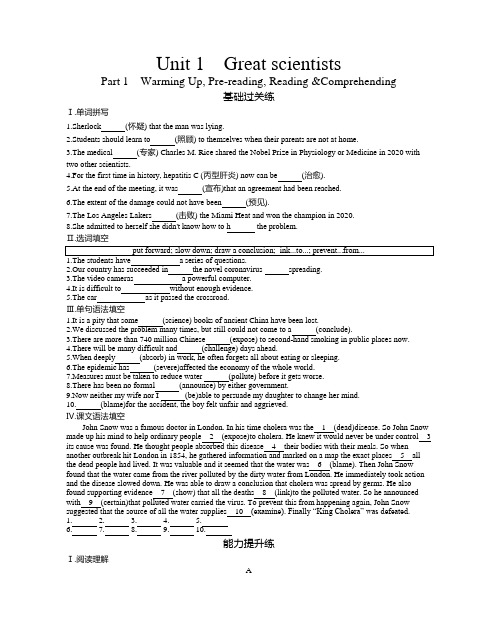
Unit 1Great scientistsPart 1Warming Up, Pre-reading, Reading &Comprehending基础过关练Ⅰ.单词拼写1.Sherlock(怀疑) that the man was lying.2.Students should learn to(照顾) to themselves when their parents are not at home.3.The medical(专家) Charles M. Rice shared the Nobel Prize in Physiology or Medicine in 2020 with two other scientists.4.For the first time in history, hepatitis C (丙型肝炎) now can be(治愈).5.At the end of the meeting, it was(宣布)that an agreement had been reached.6.The extent of the damage could not have been(预见).7.The Los Angeles Lakers(击败) the Miami Heat and won the champion in 2020.8.She admitted to herself she didn't know how to h the problem.Ⅱ.选词填空2.Our country has succeeded in the novel coronavirus spreading.3.The video cameras a powerful computer.4.It is difficult to without enough evidence.5.The car as it passed the crossroad.Ⅲ.单句语法填空1.It is a pity that some(science) books of ancient China have been lost.2.We discussed the problem many times, but still could not come to a(conclude).3.There are more than 740 million Chinese(expose) to second-hand smoking in public places now.4.There will be many difficult and(challenge) days ahead.5.When deeply(absorb) in work, he often forgets all about eating or sleeping.6.The epidemic has(severe)affected the economy of the whole world.7.Measures must be taken to reduce water (pollute) before it gets worse.8.There has been no formal(announce) by either government.9.Now neither my wife nor I (be)able to persuade my daughter to change her mind.10.(blame)for the accident, the boy felt unfair and aggrieved.Ⅳ.课文语法填空John Snow was a famous doctor in London. In his time cholera was the1(dead)disease. So John Snow made up his mind to help ordinary people2(expose)to cholera. He knew it would never be under control3 its cause was found. He thought people absorbed this disease4their bodies with their meals. So when another outbreak hit London in 1854, he gathered information and marked on a map the exact places5all the dead people had lived. It was valuable and it seemed that the water was6(blame). Then John Snow found that the water came from the river polluted by the dirty water from London. He immediately took action and the disease slowed down. He was able to draw a conclusion that cholera was spread by germs. He also found supporting evidence7(show) that all the deaths8(link)to the polluted water. So he announced with9(certain)that polluted water carried the virus. To prevent this from happening again, John Snow suggested that the source of all the water supplies10(examine). Finally “King Cholera” was defeated.1. 2. 3. 4. 5.6. 7. 8. 9. 10.能力提升练Ⅰ.阅读理解A(2021河北沧州高二上月考,)If you were asked to imagine a scientist, what image would come to your mind? The idea that most of the kids have is a man wearing a white lab coat with messy hair, big glasses, and cups of colorful liquids giving off clouds of smoke. As for adults, the majority regard scientists as strange people who spend a lot of time working in a lonely lab. However, the reality is quite different.Recently I've had a chance to take part in a scientific experience far from my lab and into Costa Rica. It has a large amount of wildlife due to its geographical placement between North and South America. It is home to more than 500,000 species (物种), which represents nearly 4% of the species worldwide!First we worked to protect wildlife at a leatherback turtle (棱皮龟) protection center. We helped the volunteers to remove rubbish from the beach to create a safe environment for turtle eggs to come out. After that we stayed at Arenal Volcano where we studied crustal(地壳的) activity linked to earthquakes. During our stay at Arenal, we rode over the mountainous areas and took a long walk through the rainforest. On the last day we got a professional introduction of rocket (火箭) science and learned about new rocket technology that will be used on the international space station.During my Costa Rica experience, I know that being a scientist doesn't mean working in a lab day and night. A scientist is the one who loves learning and getting a better understanding of the world from helping protect wildlife, learning about earthquakes or inventing rockets. I think that science is so much more than wearing a lab coat and mixing chemicals. Kids need to be aware of the excitement and adventures science can bring!1.According to Paragraph 1, scientists are often believed.A.to do experiments in messy labsB.to spend too much time in labsC.to wear clothes in a different wayD.to work in dangerous conditions2.What did the author do in Costa Rica?A.He experienced an earthquake.B.He took part in rocket experiments.C.He picked up rubbish on the beach.D.He helped the volunteers collect turtle eggs.3.What does the author learn about science from his Costa Rica experience?A.Science is full of boring experiments.B.Science is related to chemical liquids.C.Science is more than working in a lab.D.Science is about wildlife and earthquakes.4.What is the best title for the passage?A.What a Scientist Is likeB.Where a Scientist WorksC.How I Traveled in Costa RicaD.Why I Chose to Study ScienceB(2020黑龙江鹤岗一中高二上期末,)Inventor, physicist, surveyor, astronomer, biologist, artist...Robert Hooke was all these and more. Some say he was the most outstanding experimental scientist of the 17th century. In the course of his work, he cooperated with famous men of science like Isaac Newton, and the great architect Christopher Wren.Hooke's early education began at home, under the guidance of his father. He entered Westminster School at the age of 13, and from there went to Oxford, where he came in contact with some of the best scientists in England. Hooke impressed them with his skills at designing experiments and inventing instruments. In 1662, at the age of 28, he was named Curator of Experiments at the newly formed Royal Society of London—meaning that he was responsible for demonstrating (展示) new experiments at the society's weekly meeting. Hooke accepted the job, even though he knew that the society had no money to pay him!Watching living things through a microscope was one of his favourite pastimes. He invented a compound microscope for this purpose. One day while observing a cork (软木塞) under a microscope, he saw honeycomb-like structures. There were cells—the smallest units of life. In fact, it was Hooke who invented the term “cell” as the box-like cells of the cork reminded him of the cells of a monastery (修道院).Another achievement of Hooke's is his book Micrographia, which introduces the enormous potential of the microscope. It contains fascinating drawings of the thing he saw under the microscope. The book also includes, among other things, ideas on gravity, light and combustion (燃烧) that may have helped scientists like Newton when they were developing their own theoretical frameworks on these phenomena.Hooke made a valuable contribution to astronomy too. A crater on the moon is named after him in honour of his service to this branch of science.5.Why did Hooke accept the job as Curator of Experiments?A.He liked designing experiments.B.His family needed his support.C.His parents couldn't afford his education.D.He wanted to please some famous scientists.6.What does the underlined word “pastimes” in Paragraph 3 mean?A.Jobs.B.Experiments.C.Hobbies.D.Structures.7.What can we know about Hooke?A.He went to Oxford in 1645.B.He was well paid at the Royal Society of London.C.He made a contribution to medicine.D.His book Micrographia may have helped Newton.8.Which word can be used to describe Hooke?A.Honest.B.Creative.C.Reliable.D.Modest.Ⅱ.七选五(2020河南师大附中高二上期末,)How to Succeed in ScienceTo succeed in science, you need a lot more than luck. In my view, you have to combine intelligence with a willingness not to follow conventions when they block your forward path. Thus, these have come to be my rules for success.1That might sound proud, but the fact is that you must always turn to people who are brighter than you. It's like playing any game. Even as a child, I never wanted to play games with anyone who was as bad as I was. If you win, it will give you no pleasure. And in the game of science or life, the highest goal isn't simply to win; it's to win at something really difficult. 2.Take risksTo make a huge success, a scientist has to be prepared to get into deep trouble. If you are going to make a huge jump in science, you will very likely be unqualified to succeed by definition. 3. This can be more than personally upsetting.Never do anything that bores youMy experience in science is that someone is always telling you to do things, and then leaves you alone. I'm not good enough to do well in something I dislike. 4.It's very hard to succeed if you don't want to be with other scientists, because you have to go to key meetings where you spot key facts that would have escaped you. And you have to chat with your competitors, even if you find them objectionable.So my final rule is: 5.A.Meet challenges with great courageB.If you can't stand being with your real peers, get out of scienceC.Put another way, it's to go somewhere beyond your ability and come out on topD.Be sure you always have someone to save you from a deep messE.Avoid foolish peopleF.In fact, I find it hard to do well in something I likeG.Besides, you even have to be prepared to disbelieve your scientific heroes1. 2. 3. 4. 5.答案全解全析Unit 1Great scientistsPart 1Warming Up, Pre-reading,Reading &Comprehending基础过关练Ⅰ.1.suspected 2.attend 3.expert 4.cured 5.announced6.foreseen7.defeated8.handleⅡ.1.put forward 2.preventing;from 3.are linked to 4.draw a conclusion 5.slowed downⅢ.1.scientific考查形容词。
高中英语 Unit 5 First aid Warming up and reading 教案 必修
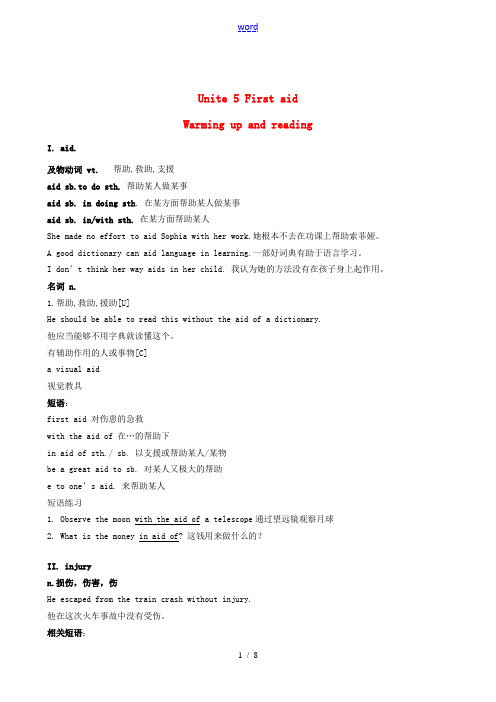
Unite 5 First aidWarming up and readingI. aid.及物动词 vt. 帮助,救助,支援aid sb.to do sth.帮助某人做某事aid sb. in doing sth. 在某方面帮助某人做某事aid sb. in/with sth.在某方面帮助某人She made no effort to aid Sophia with her work.她根本不去在功课上帮助索菲娅。
A good dictionary can aid language in learning.一部好词典有助于语言学习。
I don’t think her way aids in her child. 我认为她的方法没有在孩子身上起作用。
名词 n.1.帮助,救助,援助[U]He should be able to read this without the aid of a dictionary.他应当能够不用字典就读懂这个。
有辅助作用的人或事物[C]a visual aid视觉教具短语:first aid 对伤患的急救with the aid of 在…的帮助下in aid of sth./ sb. 以支援或帮助某人/某物be a great aid to sb. 对某人又极大的帮助e to one’s aid. 来帮助某人短语练习1. Observe the moon with the aid of a telescope通过望远镜观察月球2. What is the money in aid of? 这钱用来做什么的?II. injuryn.损伤,伤害,伤He escaped from the train crash without injury.他在这次火车事故中没有受伤。
相关短语:do sb. an injury / do an injury to 伤害某人 ,对…造成伤害be an injury to 伤害……,危害injure vt. 伤害 injured adj. 受伤的 the injured 伤员hurt/ wound/ injure/ harm主要用于由生命的东西,指"使人的肉体受伤而疼痛",或"伤了人的自尊心或感情"。
人教版英语必修1:Unit5 section ⅰ warming up & reading
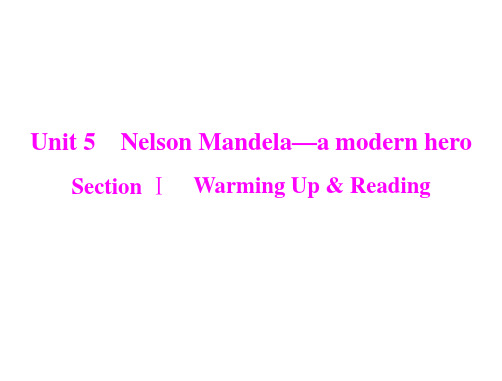
qualities ②Tom has all the __________ of a great man.
2.mean adj.吝啬的;自私的;卑鄙的 典例 He is mean over/about/with money.他对钱很吝啬。 It is mean of you to tease her.你捉弄她太卑鄙了。 拓展 mean (meant, meant) vt. (1)意思是;意味着(常接名词、代词、动名词或从句) Missing the train means waiting for another hour. 错过了火车就意味着要再等一个小时。
A great person is someone who devotes his/her life to
helping others.伟人是终生致力于帮助他人的人。 4.devote vt.(与 to 连用)献身;专心于 典例 He devotes himself to writing. 他专心写作。 拓展 devote... to (doing) sth.献身/专心于(做)某事 devoted adj.忠实的;深爱的 be devoted to (doing) sth.献身/专心于(做)某事 be devoted to sb.忠诚于某人
B.Joining the ANC Youth League.
C.Fighting for the freedom of the blacks. D.Fighting against the government peacefully.
4.According to the text, which of the following is NOT true about Nelson Mandela?_________. C A .He was kind to Elias and even helped him to stay in Johannesburg. B . He was one of the top organizers of the ANC Youth League.
人教版高中英语必修5教师用书:Unit 1 Section_Ⅱ Warming Up - Reading — Language Points (含答案)
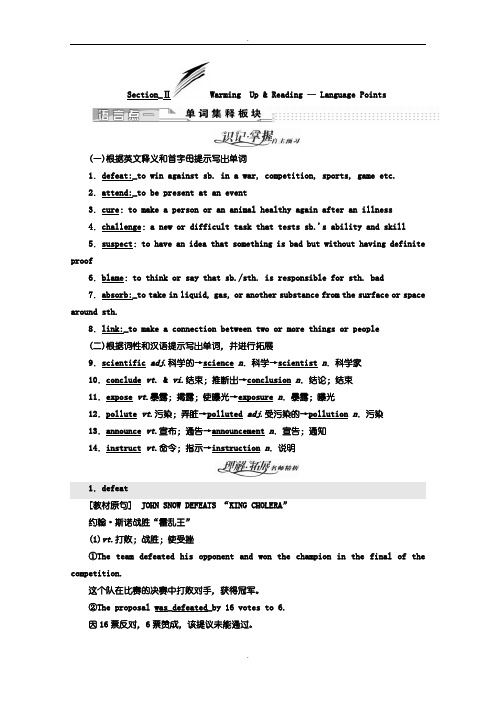
Section_ⅡWarming Up & Reading — Language Points(一)根据英文释义和首字母提示写出单词1.defeat:_to win against sb. in a war, competition, sports, game etc.2.attend:_to be present at an event3.cure:to make a person or an animal healthy again after an illness4.challenge:a new or difficult task that tests sb.'s ability and skill5.suspect:to have an idea that something is bad but without having definite proof6.blame:to think or say that sb./sth. is responsible for sth. bad7.absorb:_to take in liquid, gas, or another substance from the surface or space around sth.8.link:_to make a connection between two or more things or people(二)根据词性和汉语提示写出单词,并进行拓展9.scientific adj.科学的→science n.科学→scientist n.科学家10.conclude vt. & vi.结束;推断出→conclusion n.结论;结束11.expose vt.暴露;揭露;使曝光→exposure n.暴露;曝光12.pollute vt.污染;弄脏→polluted adj.受污染的→pollution n.污染13.announce vt.宣布;通告→announcement n.宣告;通知14.instruct vt.命令;指示→instruction n.说明1.defeat[教材原句] JOHN SNOW DEFEATS “KING CHOLERA”约翰·斯诺战胜“霍乱王”(1)vt.打败;战胜;使受挫①The team defeated his opponent and won the champion in the final of the competition.这个队在比赛的决赛中打败对手,获得冠军。
高二英语人教版必修5 unit 1 warming up.ppt

Charles Darwin 达尔文(British)
“The Origin of Species”
Thomas Newcomen
托玛斯 · 纽科门
(1663-1729) British
He invented a steam engine. James Watt improved it and turned it into the first modern steam engine used on the railways.
seismograph Zhang Heng
Stephen Hawking 斯帝芬·霍金
The theory about black holes
What is a black hole?
Q
Answers
1. 2. 3. 4. 5. 6. 7. 8. 9. 10. Archimedes Charles Darwin Thomas Newcomen Gregor Mendel Marie Curie Thomas Edison Leonardo da Vinci Sir Humphry Davy Zhang Heng Stephen Hawking
Unit 1 Great scientists
Period 1 warming up
Who is he?
He has made a famous kite experiment. He learned a lot from it and invented lightning rod(避雷针). He is … Benjamin Franklin
英语:unit5《nelson-mandela-a-modern-hero》warming-up课件(1)(新人教版必修1)

7.
8.
Tell True or False Elias met Nelson Mandela at school. F Nelson Mandela was a black lawyer. T Elias was unable to read or write because he was lazy. F Nelson Mandela helped him keep his job. T Elias was happy blowing up government building. F believed that black people were being treated as well as white people in South Africa. F Nelson Mandela thought violence was a good way to help black people. F The government were happy with Nelson Mandela and the ANC.
Part 2
3
5
Detail studies
1.What do you think is the purpose of this passage ? 2. Do you think Elias tells his story well ? Give reasons 3. What is the tone of Elias’ story ? Do you like Elias because of the way he tells his story ? Give a reason.
( 1484-1536 )
Priest and scholar
(完整版)人教版高中英语必修五Unit1知识点详解

必修5 Unit1 Great scientistsPart 1. Warming up1.explain及物动词(vt.)解释;说明;阐明[(+to)][+wh-][+(that)]He explained that he had been cheated. 他解释说他是上当受骗了。
Can you explain how the machine operates?你能解释一下这机器是如何运转的吗?Please explain this rule to me.请给我讲解一下这条规则。
不及物动词(vi.)解释;说明;辩解I've got to explain about it. 我得解释一下此事。
2.characteristicn. 特征;特性Kindness is one of his characteristics.adj. 独特的I heard my friend’s characteristic laugh.be characteristic of sb./sth. 是.....的特性Such bluntness is characteristic of hin. 如此迟钝是他的特性。
3. Who put forward a theory about black holes?put forward 提出(建议等);提名;提前,把时钟往前拨He put forward a new plan. 他提出一个新计划。
May I put your name forward as a possible chairman of the committee?我能否提名你当委员会主席?[归纳拓展]put down 记下;镇压put out 关掉;熄灭put aside 放在一边;储存;保留put off 推迟;延期put up 建造;举起;张贴put on 穿上put away 收好选词填空(put off, put up, put forward, put aside, put out)①The plan that you _____ at the meeting is wonderful.②Many tall buildings were _____ along the road.③Firefighters have been called to _____ the fire in the city center.④He has a little money to _____ for a rainy day.⑤Don’t _____ until tomorrow what can be done today.Part 2. Pre-reading, reading and comprehending1. Do you know how to prove a new idea in scientific researchhow to prove a new idea 为“疑问词+不定式”结构,该结构可在句中作主语、宾语、表语等。
人教版高二英语必修五unit1-Warming-upPPT课件
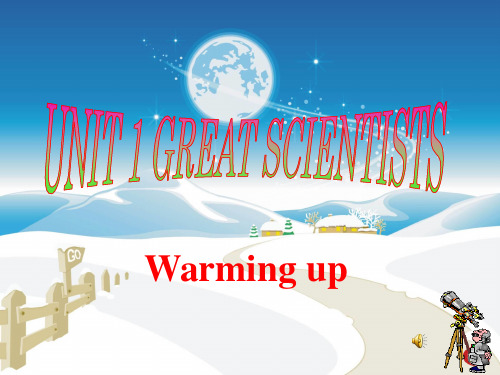
invented by him ,
also called the
Davy lamp
2020年9月28日
16
Let’s do a quiz about some scientists
9. Who invented the first seismograph to indicate in the direction of an earthquake?
Newcomen’s steam engine
2020年9月28日
9
Let’s do a quiz about some scientists
4. Who used peas to show how physical characteristics are passed from parents to their children?
5. Who discovered radium in 1898? She received two Nobel Prizes, one for physics and one for chemistry. Madame Curie(Polish) 居里夫人
The Only person ever to receive two Nobel Prizes , one in physics and the other in chemistry.
Warming up
2020年9月28日
1
Learning aims
1.To talk about great scietists. 2.To konw about their achievements. 3.To be able to express in English freely.
2020年人教版英语(必修1)课后强化作业:unit 5 section 1(含答案)
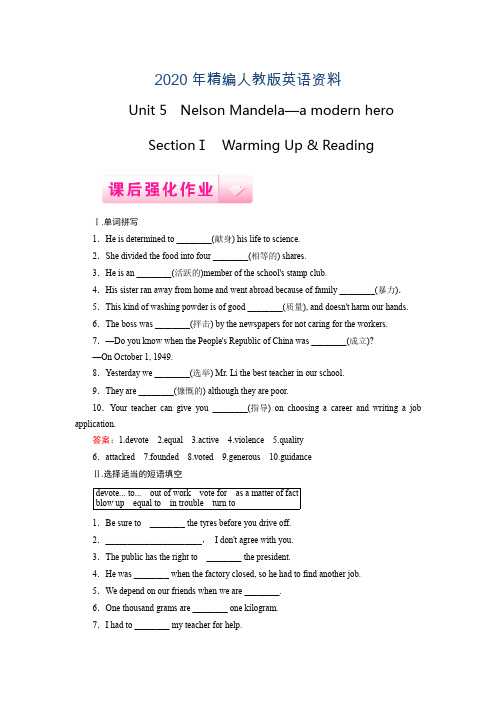
2020年精编人教版英语资料Unit 5 Nelson Mandela—a modern heroSectionⅠWarming Up & ReadingⅠ.单词拼写1.He is determined to ________(献身) his life to science.2.She divided the food into four ________(相等的) shares.3.He is an ________(活跃的)member of the school's stamp club.4.His sister ran away from home and went abroad because of family ________(暴力).5.This kind of washing powder is of good ________(质量), and doesn't harm our hands.6.The boss was ________(抨击) by the newspapers for not caring for the workers.7.—Do you know when the People's Republic of China was ________(成立)?—On October 1, 1949.8.Yesterday we ________(选举) Mr. Li the best teacher in our school.9.They are ________(慷慨的) although they are poor.10.Your teacher can give you ________(指导) on choosing a career and writing a job application.答案:1.devote 2.equal 3.active 4.violence 5.quality6.attacked7.founded8.voted9.generous10.guidanceⅡ.选择适当的短语填空devote... to...out of work vote for as a matter of factblow up equal to in trouble turn to1.Be sure to ________ the tyres before you drive off.2.______________________,I don't agree with you.3.The public has the right to ________ the president.4.He was ________ when the factory closed, so he had to find another job.5.We depend on our friends when we are ________.6.One thousand grams are ________ one kilogram.7.I had to ________ my teacher for help.8.They ________ all their hours ________ working in their lab.答案:1.blow up 2.As a matter of fact 3.vote for 4.out of work 5.in trouble 6.equal to 7.turn to8.devote;toⅢ.语法填空1.The suits are ________good quality and are worth ________(buy).答案:of; buying考查非谓语动词和固定搭配。
人教版高中英语必修五Unit 1 Great scientists 1.1
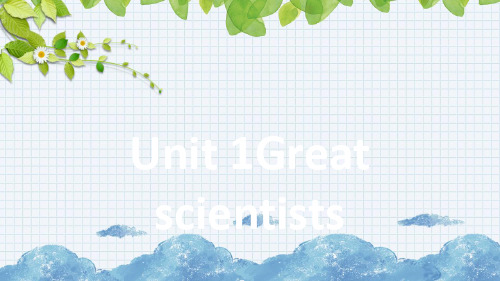
Section Ⅰ Warming Up,Pre-
一二三 四五
一、词义匹配
A
B
1.suspect a.to tell people something about a decision,plans,etc.
2.blame b.to deal with a situation,or a person
Unit 1Great scientists
【文章导语】 Have you heard of Newton,a famous scientist?There are many interesting stories about him.Here is one.
你听说过著名科学家牛顿吗?关于他,有许多有趣的故事。下面 就是其中之一。
adj.受污染的
一二三 四五
四、阅读课文JOHN SNOW DEFEATS “KING CHOLERA”,回
答下列问题
1.According to John Snow’s view,
.
A.Queen Victoria suffered a lot from bad health
B.a cure had been found for cholera before his time
C.cholera’s cause had to be discovered in order to control it
D.thousands of terrified people knew what they should do
答案:C
一二三 四五
2.Which of the following theories did John Snow believe in?
2020-2021学年英语人教版必修2:Unit 5 Ⅰ Warming Up and
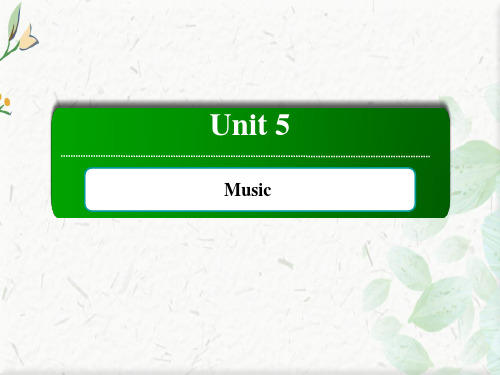
form the habit of... 养成……的习惯 in the form of 以……的形式
4.passer-by n. [C]过路人;行人 Police asked passers-by if they had seen the accident. 警察询问过路的人是否目击了这次事故。
attach...to 中的 to 是介词,后面要接名词、代词或动名词。
3.form vt. & vi. (使)组成;形成;构成 n.[C]形状;形 式
Native Australians form a large percentage of the population. 澳大利亚土著人占人口的比例很大。 A cloud of smoke formed over the burning building. 燃烧的建筑上空出现了一片烟云。 In the early morning light we could just see the dark forms of the mountains. 在晨曦中,我们仅能看到群山的轮廓。
broad(广)+cast(扔,播)→broadcast v. & n. 广播;播放 broadcaster n. [C]广播员
9.humorous adj. 幽默的;诙谐的 Our English teacher is a humorous person. 我们的英语老师是个幽默的人。 His humorous words made us laugh at once. 他诙谐的语言让我们立刻大笑起来。
to be doing sth. 假装正在做某事 to have done sth. 假装做了某事
2.attach vt. & vi. 系上;缚上;附加;连接 She attached labels to all her bags. 她把标签贴在所有的袋子上。 This middle school is attached to a local university. 这所中学附属于当地一所大学。
- 1、下载文档前请自行甄别文档内容的完整性,平台不提供额外的编辑、内容补充、找答案等附加服务。
- 2、"仅部分预览"的文档,不可在线预览部分如存在完整性等问题,可反馈申请退款(可完整预览的文档不适用该条件!)。
- 3、如文档侵犯您的权益,请联系客服反馈,我们会尽快为您处理(人工客服工作时间:9:00-18:30)。
The Last Supper
Let’s do a quiz about some scientists
8. Who invented a lamp to keep miners safe underground in 1815?
Thomas Edison 爱迪生
Watt 瓦特
Sir Humphry Davy 大卫· 汉弗莱
托玛斯 · 纽科门
(1663-172Байду номын сангаас) British
It was he who invented a steam engine. James Watt improved it and turned it into the first modern steam engine used on the railways.
The Only person ever to receive two Nobel Prizes , one in physics and the other in chemistry.
Let’s do a quiz about some scientists
6. Who invented the way of giving electricity to everybody in large cities? Thomas Edison 爱迪生
Let’s do a quiz about some scientists
1. Which scientist discovered that objects in water are lifted up by a force that help them float? “Give me a place to stand a Greek mathematician on, and I will move the
Finish exercises on exercise book
Madame Curie 居里夫人
Isaac Newton 牛顿
Gregor Mendel 门道尔
Gregor Mendel
门德尔(1822-1884) Czech (捷克)
Inheritance遗传
Let’s do a quiz about some scientists
5. Who discovered radium in 1898? She received two Nobel Prizes, one for physics and one for chemistry. Madame Curie(Polish) 居里夫人
TV
air-conditioner
How did you spend your summer holiday?
plane train car
I put forward the theory about black holes.
Scientists & Contributions:
Alexander Bell Thomas Edison Wright Brothers Madame Curie Franklin Steven Hawking Elbert Einstein Isaac Newton electricity the First telephone the electric Lamp black holes in Universe Theory of Gravity the First Plane Radium the Theory of Relativity
[mæθəmə'tɪʃən]
earth”
Archimedes 阿基米德
Let’s do a quiz about some scientists
2. Who wrote a book explaining how animals and plants developed as the environment changed? The Origin of Species
Let’s do a quiz about some scientists
7. Who was the painter that studied dead bodies in order to improve his paintings of people? Leonardo da Vinci 达芬奇
e.g. I put myself forward as the monitor.
Summary
Some scietists: 1.Archimedes 2.Charles Darwin 3.Marie Curie 4.Thomas Edison 5.Leonardo da Vinci
Homework
Newcomen’s steam engine
Let’s do a quiz about some scientists
4. Who used peas to show how physical characteristics are passed from parents to their children?
Charles Darwin 达尔文
Let’s do a quiz about some scientists
3. Who invented the first steam engine?
Thomas Newcomen 纽科门
Watt 瓦特
Thomas Edison 托马斯 爱迪生
Thomas Newcomen
Humphry Davy (British ) 汉弗莱 戴维
The safety lamp invented by him , also called the Davy lamp
Let’s do a quiz about some scientists
9. Who invented the first seismograph to indicate in the direction of an earthquake?
Zhang Heng
Seismograph ['saizməɡrɑ:f]
Let’s do a quiz about some scientists
10. Who put forward a theory about black holes? Stephen Hawking 霍金
1.Who put forward a theory about black holes. (1) 提出( + 表示建议 , 计划等的名 put forward 词)=come up with e.g. put forward a very good suggestion/plan 提出了一个很好的建议 /计划 (2) 把...向前拨 e.g. You ought to put your watch forward ten minutes. (3) 推荐
Warming up
Learning aims
1.To talk about great scietists.
2.To konw about their achievements. 3.To be able to express in English freely.
Free talk
computer
